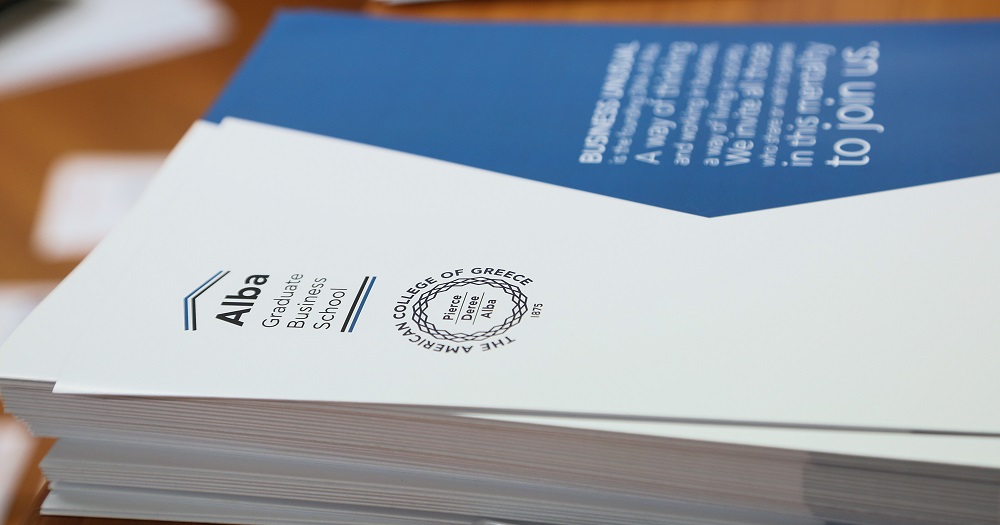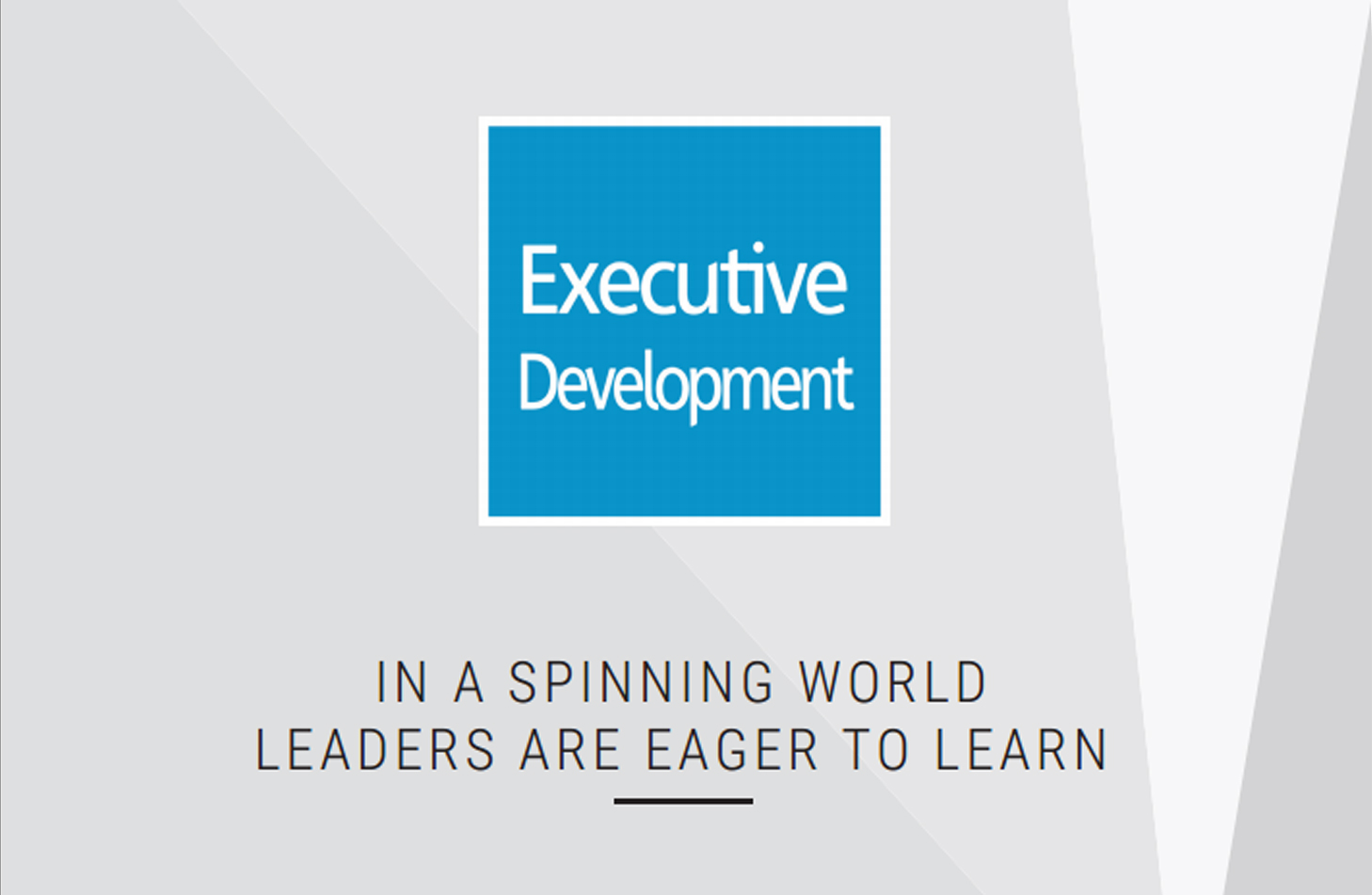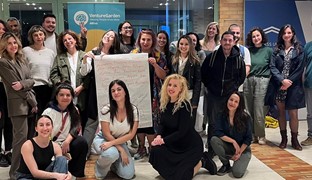Dr. Michael G. Jacobides at “The Alba Leading Scholars Series”
Acclaimed Professor Michael Jacobides challenges our thinking in the second compelling lecture of the series, focusing on competition and the digital ecosystems

In what ways is competition changing and what form will it take in the future?
What are the challenges that emerging digital giants are facing in industries under transformation and how are enterprises altering their operations as they are departing from their traditional structures and taking over an increasing set of interconnected ecosystems?
What should companies – which are neither Google nor Apple – do to compete in a world where digital ecosystems are the flavor of the day?
It is those topics that Dr. Michael Jacobides, Sir Donald Gordon Chair for Entrepreneurship and Innovation at London Business School, addressed during the second lecture of the Alba Leading Scholars Series, held on Monday, June 3, at the Alba Graduate Business School premises. The event – themed “Competing in a world of Digital Ecosystems” – was well attended, attracting more than 80 guests from the academic and business world, among whom high-profile executives.
Dr. Jacobides,who was awarded the “Theory to Practice” Strategy Award at the 2018 Vienna Strategy Summit, had the opportunity to present his forthcoming research in Harvard Business Review, which contained insights from his participation in the World Economic Forum, his role in the Boston Consulting Group and his collaboration with leading entreprises and entrepreneurial ventures.

Alba Dean Dr. Kostas Axarloglou said in his opening speech: “The Alba Leading Scholars Series is a series of lectures where he have the honor to host thought leaders who stand out for their academic research and its impact on management thinking. In this series of lectures we host leaders who balance academic research with practical implementation in business and we make this knowledge relevant to the business community. Such is the role of a Business School. Today we have the honor to host Professor Jacobides who is going to share with us his insights on modern economy, the digital economy.”

Upon introducing the speaker, Dr. George Batsakis, Associate Professor of International Business at Alba, mentioned that: “From a strategic point of view, things have changed. Enterprises now work together and create business ecosystems where value is co-created rather than generated by a single enterprise. Dr. Jacobides’s research is cutting-edge and valuable to practitioners.”
Dr. Jacobides took the floor and commented that the world changes, bringing forth new winners and losers, and went on to remark that –according to Fortune 500– 52% of enterprises have vanished from the map since 2000. At the same time new ecosystems will emerge and substitute traditional industries by 2025.

To understand competition through the lens of digital ecosystems, however, one must answer –according to Professor Jacobides– a series of important questions: What is changing in the background and what structural changes will enterprises and industries are going to undergo? What are digital ecosystems and in what are they different from other forms of organization? Why are digital ecosystems so relevant these days? And how should a company adapt its strategy to engage in and with digital platforms and ecosystems?
“The traditional barriers of firms and sectors have collapsed and what we are witnessing now is a gradual change” said the speaker, alluding to the decline of the guild system in the era of technological evolution. “The ecosystem is now the new basis of competition” said Dr. Jacobides citing Nokia’s CEO, Stephen Elop. “The battle of devices has now become a war of ecosystems, where ecosystems include not only the hardware and software of the device, but developers, applications, ecommerce, advertising, search, social applications, location-based services, unified communications and many other things. Our competitors aren't taking our market share with devices; they are taking our market share with an entire ecosystem. This means we're going to have to decide how we either build, catalyse or join an ecosystem.”
“Ecosystems arose from the need to make things work together and offer increasingly added value to the final recipient” explained the speaker and commented that today’s digitization allows us to reshape labor according to our will. On the matter how firms will adapt to this new reality, Dr. Jacobides said that they should be more sensitive to the customers’ needs and start anew, while he added that the creators of large ecosystems will want to foresee and respond to the final customer’s every move.

On a closing note, Dr. Jacobides reminded the audience that digital ecosystems require a culture of flexibility and innovation, which involves: taking risks and the pressure for results through a process of constant trial and smart failure; focusing on speed; laying emphasis on collaboration and the sharing of ideas; and finally solving problems with customers as well as with partners.
The presentation was followed by an interesting Q&A session.


More about the Keynote Speaker
Michael G. Jacobides holds the Sir Donald Gordon Chair of Entrepreneurship & Innovation at London Business School, where he is Professor of Strategy. He is Academic Advisor to the Boston Consulting Group, Visiting Scholar at the New York Fed, and Visiting Fellow at Cambridge.
A frequent keynote speaker, he engages in corporate, industry, and broad-appeal events such as TEDx and the Global Drucker Forum, and works with companies as they adjust to a shifting environment.
He studies industry evolution, new business models, value migration and structural change in firms and sectors, and looks at how digital ecosystems transform the business context. He teaches strategy, innovation, transformation and turnarounds, and works on thought leadership with consultants such as McKinsey, IDEO, Accenture, PwC and Deloitte, and on strategy with corporates such as Santander, Zurich, CS, Airbus, Lufthansa, Vodafone, Nokia, DeBeers, Burberry, MerckSerono and the NHS.
He advises disruptive start-ups and established firms alike, and has worked with policy makers in Europe and the US. He has visited Harvard, NYU, Cambridge, Imperial, Bocconi and Wharton, where he obtained his PhD, after studying at Athens, Cambridge and Stanford. His work has appeared in the top academic journals such as SMJ, AMJ, AMR, OrgSci and Industrial & Corporate Change, where he is a co-Editor, as well as HBR and FT, and appears on CNN and BBC. On policy, he has worked with the UK parliament (on the future of financial services), the European Council (on innovation in Europe) and has spearheaded RedesignGreece. He served on the Global Agenda Council of the World Economic Forum, where he is the Academic Lead on the Digital Ecosystems project, and has presented in the Davos Annual meetings.







